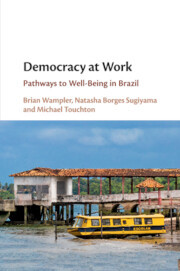Description
Democracy at Work
Pathways to Well-Being in Brazil
Authors: Wampler Brian, Sugiyama Natasha Borges, Touchton Michael
Demonstrates how specific dimensions of democracy - participation, citizenship rights, and an inclusionary state - enhance human development and well-being.
Language: English
Subject for Democracy at Work:
Approximative price 32.87 €
In Print (Delivery period: 14 days).
Add to cart
Democracy at Work
Publication date: 04-2022
Support: Print on demand
Publication date: 04-2022
Support: Print on demand
Approximative price 107.80 €
In Print (Delivery period: 14 days).
Add to cart
Democracy at Work
Publication date: 11-2019
370 p. · 15.6x23.5 cm · Hardback
Publication date: 11-2019
370 p. · 15.6x23.5 cm · Hardback
Description
/li>Contents
/li>Biography
/li>
One of the greatest challenges in the twenty-first century is to address large, deep, and historic deficits in human development. Democracy at Work explores a crucial question: how does democracy, with all of its messy, contested, and, time-consuming features, advance well-being and improve citizens' lives? Professors Brian Wampler, Natasha Borges Sugiyama, and Michael Touchton argue that differences in the local robustness of three democratic pathways - participatory institutions, rights-based social programs, and inclusive state capacity - best explain the variation in how democratic governments improve well-being. Using novel data from Brazil and innovative analytic techniques, the authors show that participatory institutions permit citizens to express voice and exercise vote, inclusive social programs promote citizenship rights and access to public resources, and more capable local states use public resources according to democratic principles of rights protections and equal access. The analysis uncovers how democracy works to advance capabilities related to poverty, health, women's empowerment, and education.
Introduction; 1. Democracy at work; 2. Building pathways for change; 3. Research design, methods, and variables; 4. Reducing poverty: broadening access to income; 5. Improving health: saving lives; 6. Empowering women: saving mothers and enhancing opportunities; 7. Educating society: promoting public education and learning; 8. Pathways at work: lessons from Brazil's poor Northeast; Conclusion: how democracy improves well-being.
Brian Wampler is Professor of Political Science at Boise State University, Idaho. He is the author of Activating Democracy in Brazil: Popular Participation, Social Justice, and Interlocking Institutions (2015), and Participatory Budgeting in Brazil: Contestation, Cooperation and Accountability (2007).
Natasha Borges Sugiyama Associate Professor of Political Science at the University of Wisconsin, Milwaukee. She is the author of Diffusion of Good Government: Social Sector Reforms in Brazil (2012).
Michael Touchton is Assistant Professor of Political Science at the University of Miami. He is the co-author of Salvaging Communities: How American Cities Rebuild Closed Military Bases (Forthcoming) with Amanda Johnson.
Natasha Borges Sugiyama Associate Professor of Political Science at the University of Wisconsin, Milwaukee. She is the author of Diffusion of Good Government: Social Sector Reforms in Brazil (2012).
Michael Touchton is Assistant Professor of Political Science at the University of Miami. He is the co-author of Salvaging Communities: How American Cities Rebuild Closed Military Bases (Forthcoming) with Amanda Johnson.
© 2024 LAVOISIER S.A.S.




